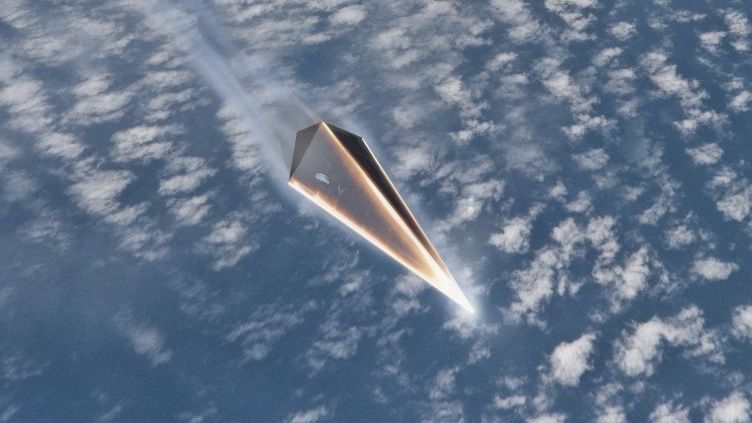The service wants this game-changing capability to be hanging off the wings of fighter jets by the early 2020s.
Category: military – Page 235

DARPA preparing to test fly two hypersonic weapons
The US Defense Advanced Research Projects Agency (DARPA) is eyeing flight tests later this year for two hypersonic weapons, and it is teaming up with the US Army on developing such a ground-launched capability. However, at the same time, army leaders are drafting plans to consolidate duelling lines of effort within their hypersonic weapons’ portfolio.
During a 1 May Defense Writers’ Group breakfast with reporters, DARPA Director Dr Steven Walker fielded questions about ongoing projects inside the Pentagon’s research arm including the development of two hypersonic weapons with the US Air Force (USAF) — the Tactical Boost Glide (TBG) and the Hypersonic Air-breathing Weapon Concept (HAWC).
“[They are] two very different concepts but when you’re talking hypersonic [weapons], it is good to have what I consider intended redundancy because it’s a hard technology, making materials and propulsion systems that last in 3,000° Fahrenheit temperatures is not easy,” Walker said.

How Big Tech is struggling with the ethics of AI
The companies that are leading research into AI in the US and China, including Google, Amazon, Microsoft, Baidu, SenseTime and Tencent, have taken very different approaches to AI and whether to develop technology that can ultimately be used for military and surveillance purposes.
Companies criticised for overruling and even dissolving ethics boards.

DARPA: This Smart Contact Lens Could Give Soldiers Superpowers
“Smart” contact lenses sound like something from a sci fi movie — but they’re real, and they could help troops in the field.
French engineering school IMT Atlantique revealed what it calls “the first stand-alone contact lens with a flexible micro battery” earlier this month.
And, notably, it caught the attention of the U.S. military’s attention: the Defense Advanced Research Projects Agency (DARPA) is reportedly interested in the contact lens to augment troops’ visual capabilities in the field, according to Task and Purpose — meaning the gadget could represent the augmented contact lens that DARPA has spent a decade searching for.
Weird Flex
The biggest challenge that IMT Atlantique engineers encountered was to scale down the battery. But thanks to a newly developed flexible micro battery, they found a way to continuously light an LED light source for “several hours,” according to a press release.

North Korea’s 2017 bomb test set off later earthquakes, new analysis finds
Using newly refined analysis methods, scientists have discovered that a North Korean nuclear bomb test last fall set off aftershocks over a period of eight months. The shocks, which occurred on a previously unmapped nearby fault, are a window into both the physics of nuclear explosions, and how natural earthquakes can be triggered. The findings are described in two papers just published online in the journal Seismological Research Letters.
The September 3, 2017 underground test was North Korea’s sixth, and by far largest yet, yielding some 250 kilotons, or about 17 times the size of the bomb that destroyed Hiroshima. Many experts believe the device was a hydrogen bomb—if true, a significant advance from cruder atomic devices the regime previously exploded. The explosion itself produced a magnitude 6.3 earthquake. This was followed 8.5 minutes later by a magnitude 4 quake, apparently created when an area above the test site on the country’s Mt. Mantap collapsed into an underground cavity occupied by the bomb.
The test and collapse were picked up by seismometers around the world and widely reported at the time. But later, without fanfare, seismic stations run by China, South Korea and the United States picked up 10 smaller shocks, all apparently scattered within 5 or 10 kilometers around the test site. The first two came on Sept. 23, 2017; the most recent was April 22, 2018. Scientists assumed the bomb had shaken up the earth, and it was taking a while to settle back down. “It’s not likely that there would be so many events in that small area over a small period of time,” said the lead author of one of the studies, Won-Young Kim, a seismologist at Columbia University’s Lamont-Doherty Earth Observatory. “These are probably triggered due to the explosion.”

The U.S. Military: Like the French at Agincourt?
“The traditional model of U.S. military power is being disrupted, the way Blockbuster’s business model was amid the rise of Amazon and Netflix,” Brose writes. “A military made up of small numbers of large, expensive, heavily manned, and hard-to-replace systems will not survive on future battlefields, where swarms of intelligent machines will deliver violence at a greater volume and higher velocity than ever before.”
America risks a catastrophic defeat if it doesn’t radically change the way it thinks about war.

Is Lockheed Martin working on a nuclear fusion-powered fighter jet?
Circa 2018
Lockheed Martin quietly obtained a patent for what could be a game-changing nuclear fusion reactor, one that could potentially fit into a fighter jet.
If the latest patent from defence manufacturing giant Lockheed Martin is anything to go by, nuclear fusion technology could revolutionise the future of travel.
For those not in the know, a nuclear fusion reactor is one of the holy grails of science, promising to replicate the inner workings of the sun in a confined reactor, capable of generating huge, near-limitless amounts of energy cheaply with no environmental impact.

Quantum sensors to make Australia safer
Now, almost 100 years later, the Department of Defence, through its Next Generation Technology Fund, has selected 11 projects that exploit the extraordinary properties of quantum mechanics to deliver improved security for Australians. The Institute for Photonics and Advanced Sensing (IPAS) at the University of Adelaide is involved in four of these ambitious projects.
IPAS will work closely with the Defence Science and Technology (DST) Group on four ambitious quantum technology projects. Three of the four projects focus on quantum detection.
One project explores whether ‘quantum’ radar can be used to detect stealth aircraft.


United States Strategic Command Photo
“To me, it’s very simple. If a rogue nation or other entity shoots an ICBM, inter-continental ballistic missile, at us, we intercept it.” — #USArmy Maj. Jason Brewer, Colorado National Guard #CombatReadyForce